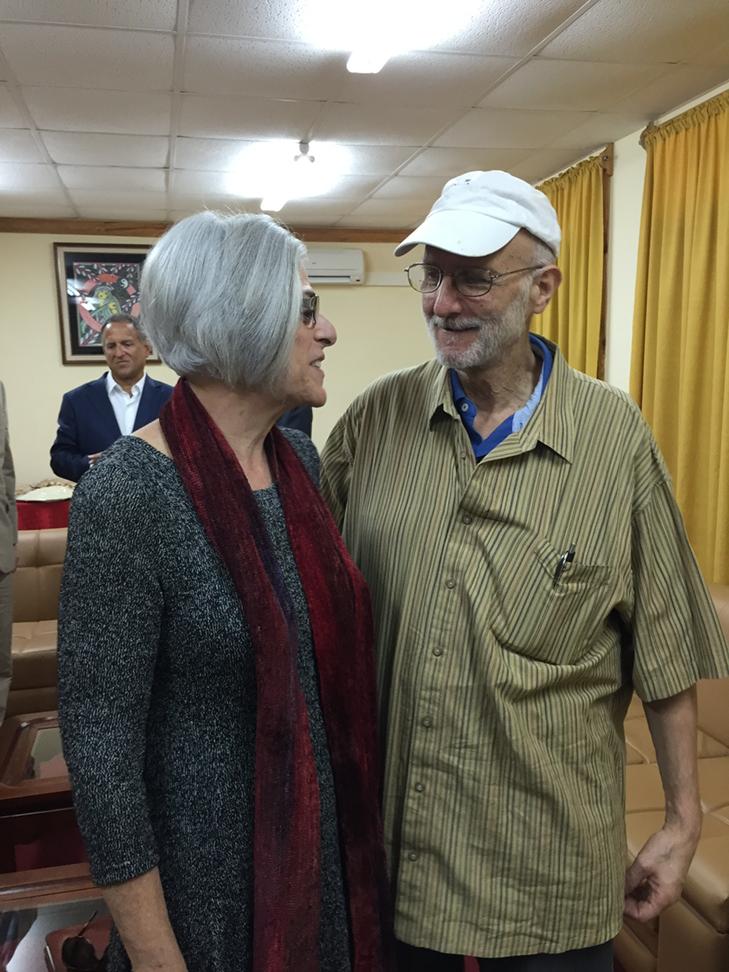When Alan Gross, a U.S.A.I.D. contractor, was detained in Cuba in December 2009, Hillary commenced a long-term effort to procure his release via direct engagement with Cuban officials as well as third party efforts. In her memoir, Hard Choices, Hillary states, "One of my regrets as Secretary was our failure to bring Alan home." Alan Gross left Cuba today, released on humanitarian grounds due to health issues, accompanied by his wife, Judy, with whom Secretary Clinton remained in close touch during her tenure.

In Hard Choices, Hillary noted that a condition Cuban officials levied on Gross's release was our release of five convicted Cuban spies. Three of those individuals have been freed in exchange for Gross's freedom. Two others were released earlier upon completing their sentences.
The exchange signals a thaw in U.S. - Cuba relations that will include re-establishment of diplomatic ties. As Secretary of State, Hillary visited 112 countries. Cuba was not among them. Perhaps she will soon have the opportunity to visit as a private citizen. One of Hillary's last acts as Secretary was to pen a letter to President Obama containing the recommendation that the Cuban embargo be re-examined. Today it appears likely that the embargo will be terminated sooner rather than later.
U.S., Cuba Seek To Normalize Relations
Posted: 12/17/2014WASHINGTON (AP) — The United States and Cuba will start talks on normalizing full diplomatic relations, marking the most significant shift in U.S. policy toward the communist island in decades, American officials said Wednesday. The announcement comes amid a series of new confidence-building measures between the longtime foes, including the release of American Alan Gross and the freeing of three Cubans jailed in the U.S.
Welcome home, Alan!
*************************************************
Hillary Clinton backs Obama move on Cuba
WASHINGTON
(Reuters) - Former U.S. Secretary of State and potential presidential contender Hillary Clinton said on Wednesday she supported President Barack Obama's move to establish diplomatic ties with Cuba after more than 50 years of hostile relations.
"Despite good intentions, our decades-long policy of isolation has only strengthened the Castro regime's grip on power," Clinton said in a statement. "As I have said, the best way to bring change to Cuba is to expose its people to the values, information and material comforts of the outside world."
She added: "I support President Obama’s decision to change course on Cuba policy, while keeping the focus on our principal objective - supporting the aspirations of the Cuban people for freedom."
************************************************************
Secretary Kerry's statement on Cuba policy changes.Announcement of Cuba Policy Changes
Press Statement
John Kerry
Secretary of StateWashington, DC
December 17, 2014
I was a seventeen year old kid watching on a black and white television set when I first heard an American President talk of Cuba as an "imprisoned island.”
For five and a half decades since, our policy toward Cuba has remained virtually frozen, and done little to promote a prosperous, democratic and stable Cuba. Not only has this policy failed to advance America's goals, it has actually isolated the United States instead of isolating Cuba.
Since 2009, President Obama has taken steps forward to change our relationship and improve the lives of the Cuban people by easing restrictions on remittances and family travel. With this new opening, the President has committed the United States to begin to chart an even more ambitious course forward.
Beginning more than twenty years ago, I have seen firsthand as three presidents -- one Republican and two Democrats -- have undertaken a similar effort to change the United States' relationship with Vietnam. It wasn't easy. It isn't complete still today. But it had to start somewhere, and it has worked.
As we did with Vietnam, changing our relationship with Cuba will require an investment of time, energy and resources. Today’s step also reflects our firm belief that the risk and the cost of trying to turn the tide is far lower than the risk and cost of remaining stuck in an ideological cement of our own making.
This new course will not be without challenges, but it is based not on a leap of faith but on a conviction that it's the best way to help bring freedom and opportunity to the Cuban people, and to promote America's national security interests in the Americas, including greater regional stability and economic opportunities for American businesses.
In January, as part of the President’s directive to discuss moving toward re-establishment of diplomatic relations, my Assistant Secretary for the Western Hemisphere Roberta Jacobson will travel to Cuba to lead the U.S. Delegation to the next round of U.S.-Cuba Migration Talks. I look forward to being the first Secretary of State in 60 years to visit Cuba. At President Obama’s request, I have also asked my team to initiate a review of Cuba’s designation as a State Sponsor of Terrorism.
Going forward, a critical focus of our increased engagement will continue to be on improving the Cuban Government’s respect for human rights and advocating for democratic reforms within Cuba. Promoting freedom of speech and entrepreneurship and an active civil society will only strengthen Cuban society and help to reintegrate Cuba into the international community.
********************************************************
Other
news emanating from the State Department today includes the forthcoming
departure of U.S.A.I.D. Administrator, Dr. Rajiv Shah. Some will
remember the "infinite frustration" Hillary expressed early in her term
in filling that post. Dr. Shah has done a magnificent job. We should
all be grateful for his dedicated service.See Dr. Shah's statement here >>>>
